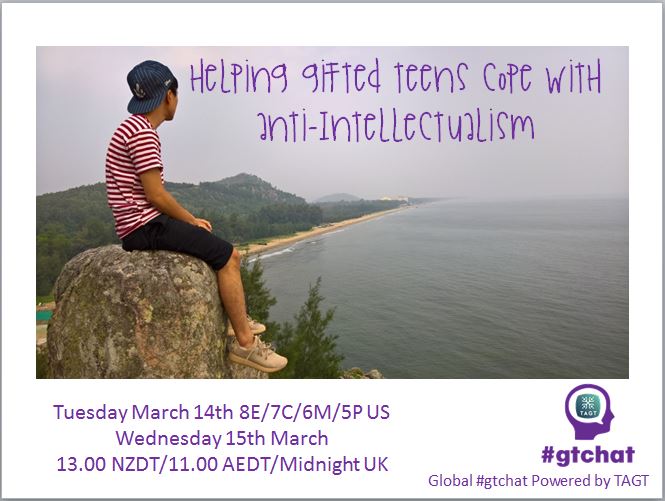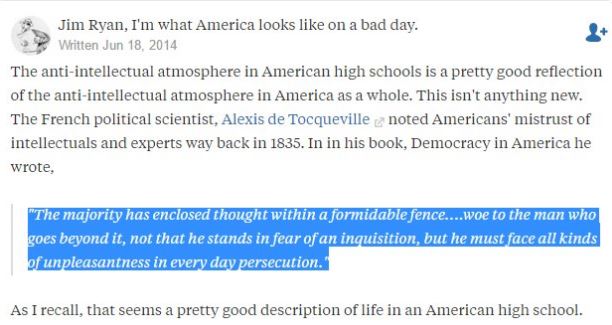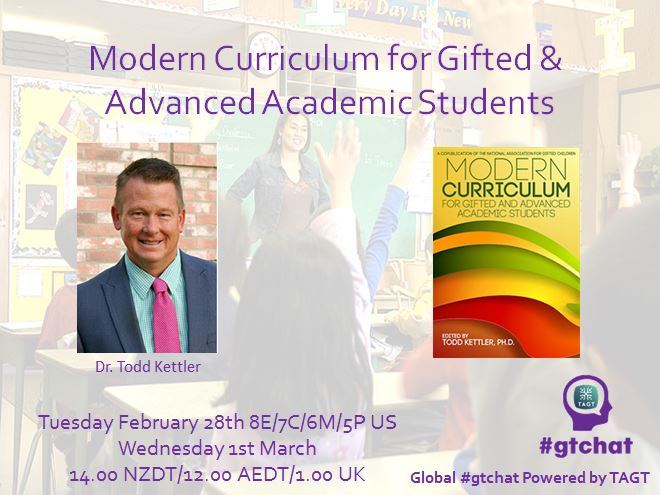
This week at #gtchat, we were joined by author, Dr. Todd Kettler,to discuss his book Modern Curriculum for Gifted and Advanced Academic Students. Dr Kettler is an assistant professor in the Department of Educational Psychology in the College of Education at the University of North Texas where he teaches courses in gifted education, creativity, and child development. In addition to his work as a teacher and researcher at the UNT, he spent 17 years as an English teacher and gifted and talented program administrator.
A basic assumption we ascribe to at #gtchat is that every student deserves to learn something new every single day. The importance of challenge cannot be overlooked. To this end, Dr. Kettler told us, “An advanced curriculum is necessary to develop elite academic performance. It is one of the primary tools used to develop students from potential into demonstrated talent. Academic coaching, mentorship, and attention to psychosocial factors are additional tools to be used. Advanced curriculum ought to exist in all facets of the GT program; but, to develop elite levels of achievement, students generally need to focus their work in one domain or a couple of related domains.”
“Let’s be clear on means and ends. Differentiation is not the goal of gifted education. Advanced curriculum experiences are not the goal of gifted education. The goal is elite levels of achievement.” ~ Dr. Todd Kettler
Advanced learning experiences should be based on a set of clear goals in gifted education. It’s important to consider how advanced learning experiences should be designed in foundational curriculum areas. Dr. Kettler explained, “Sometimes schools struggle in the development of advance curriculum. I suggest the following are common examples of shortcomings in advanced curriculum: 1) underestimating the potential outcomes of gifted levels of achievement; 2) restricting access to advanced curriculum through outdated identification protocols and school policies designed to keep student achievement standardized; 3) use of curriculum development teams with limited understanding of the critical features of advanced curriculum; and 4) teaching staff not adequately prepared to deliver an advanced curriculum even if that curriculum framework is developed for them.”
“Designing learning includes three critical features: advanced content (accelerated or increased depth and complexity), complex thinking, conceptual understanding. Student responses should be authentic to the traditions of the discipline (e.g., authentic products and performances). For instance, students should be applying the concepts and the thinking processes to address contemporary and future concerns,” expanded Dr. Kettler.
After the chat, Dr. Kettler further elaborated concerning gifted and talented curriculum design which he stated includes potential modifications at four levels of curriculum:
- Curriculum as Course of Study: How might we modify the required course of study to lead to elite achievement in one or more domains?
- Curriculum as Standards: How might the agreed upon student outcomes in a learning domain be modified and accelerated to support the development of elite achievement in one or more domains?
- Curriculum as Learning Design: How can curriculum models and complex learning designs (e.g., inquiry or problem-based learning) inform the development of day-to-day experiences?
- Curriculum of Authentic Engagement: In what ways can the school support and encourage participation in extra-curriculum learning designed to supplement the development of elite achievement in one or more domains (Math or Science Olympiads, writing contests, etc)?
What should be the goal of gifted education; self-actualization or development of eminence? This has been a point of contention in the gifted education community for years dividing along lines of researchers, educators and parents. In a nuanced explanation, Dr. Kettler framed the conversation as “the goal should be the development of elite achievement with potential toward eminence. Eminence is a tough goal for gifted education as it’s impossible to achieve by the end of high school, presumably the point where gifted education itself ends. Eminence ought to be thought of as a goal for gifted people in adulthood.”
“Self-actualization cannot be a goal of gifted education because it is a goal of all education. That does not mean we don’t care about self-actualization in gifted education, it’s just not a unique goal of what we are trying to do.” ~ Dr. Todd Kettler
Our attention was then turned to consider what world-class gifted education looks like. This question elicited many varied responses. World-class gifted education is more than a ‘program’. It should include a challenging curriculum; including critical thinking, creative thinking, and authentic research. Dr. Kettler posited that it should involve “goal orientation, focused participation, expert feedback and competition in addition to elite student achievement, intellectual engagement, exceptional faculty and policies supporting innovation. World Class means inclusive opportunities rather than exclusive identification. That’s a game changing idea. World class equals personalized learning with elite achievement goals and attention to psychosocial factors that may enhance or restrict. It requires world class training and staff; policies that remove barriers to elite achievement.”
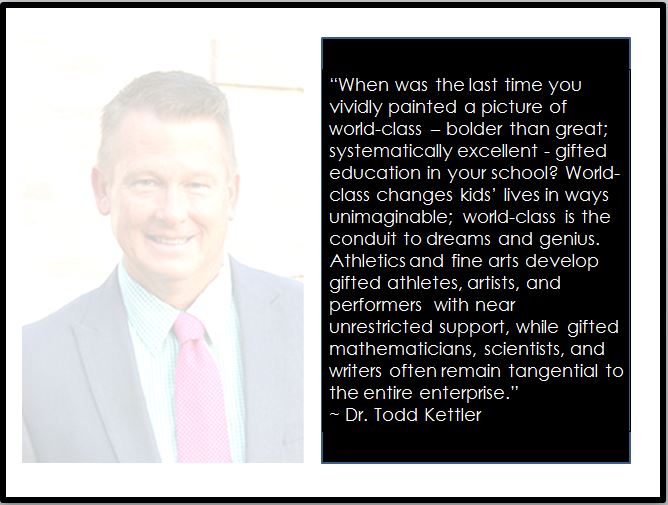
Dr. Kettler has done extensive research in elite athletic talent development to understand an orchestrated approach to elite talent development leading to potential eminence. He engaged in a 3-year, ethnographic case study of an elite youth baseball program. The explicit goal of the program was transitioning players to college and professional baseball. (Kettler, 2015) He isolated these four factors: 1) goal orientation, 2) focused participation, 3) expert feedback in real time, and 4) the importance of competition and external validation. When applying the findings to gifted education, he said, “Understand that not all students with great potential will choose to develop elite levels of talent during their years in school. Some may never choose to; others may choose later in life.”
Athletes benefit from wanting to do what they’re doing; what they conceive they’re good at; one thing, not all things. They also benefit from coaching, mentoring and opportunity for scholarships. Lisa Van Gemert, #gtchat Advisor, pointed out, “If gifted kids are going to learn from elite athletes, they’re going to have to get a lot more comfortable with practice.”
What are some positive consequences of pursuing elite talent development? Educators of gifted students who view themselves as coaches develop a clearer vision of how to approach their students. Elite talent development posits clear reasons for providing resources to gifted students. According to Dr. Kettler, “Students learn to value the process of discipline, commitment, and practice toward a valued goal.Gifted education is stuck in the periphery of education. Elite talent development moves us forward in the educational landscape.” A transcript of this chat may be found at Storify.

Global #gtchat Powered by the Texas Association for the Gifted and Talented is a weekly chat on Twitter. Join us Tuesdays at 8E/7C/6M/5P in the U.S. and Wednesdays at 14.00 NZST/12.00 AEST/1.00 UK to discuss current topics in the gifted community and meet experts in the field. Transcripts of our weekly chats can be found at Storify. Our Facebook Page provides information on the chat and news & information regarding the gifted community. Also, checkout our Pinterest Page and Playlist on YouTube.
 About the author: Lisa Conrad is the Moderator of Global #gtchat Powered by TAGT and Social Media Manager of the Global #gtchat Community. She is a longtime advocate for gifted children and also blogs at Gifted Parenting Support. Lisa can be contacted at: gtchatmod@gmail.com
About the author: Lisa Conrad is the Moderator of Global #gtchat Powered by TAGT and Social Media Manager of the Global #gtchat Community. She is a longtime advocate for gifted children and also blogs at Gifted Parenting Support. Lisa can be contacted at: gtchatmod@gmail.com
Links:
Modern Curriculum for Gifted and Advanced Academic Students (Amazon)
Todd Kettler, Ph.D.: About the Author
Differentiating Language Arts for Gifted and Advanced Learners (pdf)
An Analysis of Critical Thinking Skills with Gifted and General Education Students (pdf)
A Teacher’s Guide to Using CCSS with Gifted & Advanced Learners in the English/Language Arts (Amazon)
Teaching Argument Writing Grades 6-12 Supporting Claims w/Relevant Evidence & Clear Reasoning (Amazon)
Gifted Education Communicator: Gifts of Language Diversity (p. 13) (pdf)
Gifted Education Research 1994–2003: A Disconnect Between Priorities & Practice (pdf)
Literacy Strategies for Gifted Learners (pdf)
Organic Creativity in the Classroom: Teaching to Intuition in Academics and the Arts (Amazon) https://goo.gl/gZfviX
Todd Kettler (Keynote): National Curriculum Network Conference at Wm & Mary School of Education
Cybraryman’s Self-Directed Learning Page
Graphic courtesy of Lisa Conrad.
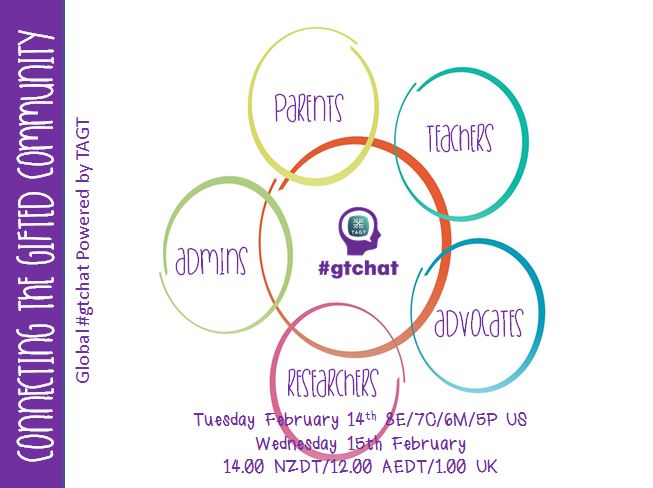

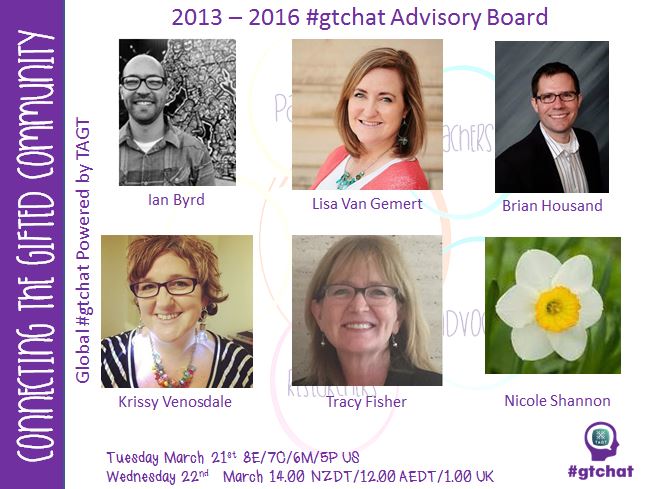



 About the author: Lisa Conrad is the Moderator of Global #gtchat Powered by TAGT and Social Media Manager of the Global #gtchat Community. She is a longtime advocate for gifted children and also blogs at Gifted Parenting Support. Lisa can be contacted at: gtchatmod@gmail.com
About the author: Lisa Conrad is the Moderator of Global #gtchat Powered by TAGT and Social Media Manager of the Global #gtchat Community. She is a longtime advocate for gifted children and also blogs at Gifted Parenting Support. Lisa can be contacted at: gtchatmod@gmail.com